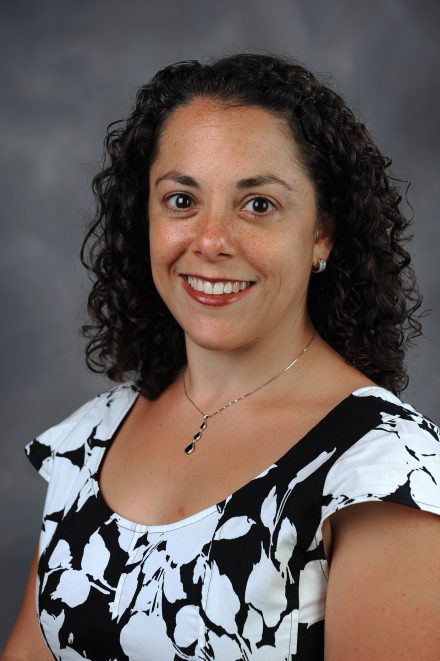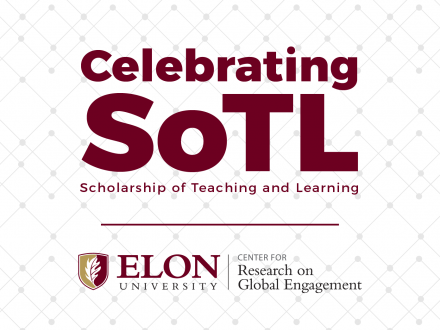Amy Allocco is researching how the Multifaith Scholars program is helping students achieve success in life after college.
Each spring, the Center for Engaged Learning (CEL), the Center for the Advancement of Teaching and Learning (CATL), and the Center for Research on Global Engagement (CRGE) join together to showcase research projects focused on the Scholarship of Teaching and Learning (SoTL). Follow along this week as we share Elon scholars’ research on innovative teaching practices through a series of Today at Elon articles.
The experiences of college-age Muslims in North Carolina, the shifting religious landscapes in South India, Jewish responses to white nationalist movements, the religious experiences of North Carolina’s African refugees — these are just some of the topics investigated by recent Elon Multifaith Scholars.
The goal of the Multifaith Scholars program is “to produce global citizens poised to address religious diversity in productive and creative ways in their chosen career fields and participate with knowledge and self-awareness in civic contexts.” Each Multifaith Scholar undertakes a closely mentored, two-year research project on a topic around religion and society, and they’re encouraged to complement this research with experiential learning opportunities such as study away and community-based learning in diverse local and global contexts.
 Associate Professor of Religious Studies and Director of the Multifaith Scholars program Amy Allocco is working with the Center for Research on Global Engagement (CRGE) to study how this type of mentored undergraduate research in global contexts connects to professional skills and competencies that are vital to students’ careers. The student scholars come from many different majors (not just religious studies), and they’ve gone on to pursue a wide variety of careers and graduate programs.
Associate Professor of Religious Studies and Director of the Multifaith Scholars program Amy Allocco is working with the Center for Research on Global Engagement (CRGE) to study how this type of mentored undergraduate research in global contexts connects to professional skills and competencies that are vital to students’ careers. The student scholars come from many different majors (not just religious studies), and they’ve gone on to pursue a wide variety of careers and graduate programs.
“These students are going on to be lawyers, diplomats, policymakers, medical professionals — they’re going on to do a range of things — and they’re bringing these essential competencies with them.,” Allocco says.
Allocco’s research is providing evidence that what students are learning as Multifaith Scholars is helping them gain skills, adopt attitudes, and develop strategies that are allowing them to thrive in their careers. The research “demonstrates in an evidence-based way that these competencies matter,” she says. “That they connect to careers, that they make students desirable to employers. That they make them better global citizens as they go into a range of careers.”
As institutions of higher education are increasingly pressured to defend the value of a liberal arts education and as they constantly assess and refine their curricula to prepare students for a rapidly changing world and job market, Allocco says that “it’s pressing that we ask these questions, and demonstrate how our disciplines directly connect to the ‘real world.’” Her research draws on assessment data from student reflections, an annual tracking of learning outcomes, semi-annual assessments of mentors and mentoring practices, and an external assessment of the program “to indicate how this developmental, blended approach that offers instrumental and psychosocial supports and takes account of student identities can produce knowledgeable, high-achieving multifaith leaders with valuable professional skills.”
More about this research will soon be available in her forthcoming article titled “Negotiating the Applied/Theoretical Dilemma at the Intersection of Interreligious Studies and Global Citizenship,” to be published in the Journal of Interreligious Studies.
 As she has collected data on the Multifaith Scholars program and engaged in the scholarship of teaching and learning to document the outcomes she sees in these students, she appreciates how the project has given her a way “to argue for the social impact and social justice potential of learning about diverse religious traditions in a way that is not detached from other concerns but rather tells an engaging and compelling story about, frankly, making the world a better place.” Elon University has exceptionally strong multifaith curricular and co-curricular initiatives, and the Multifaith Scholars program is a national model for helping students to become interculturally agile global citizens.
As she has collected data on the Multifaith Scholars program and engaged in the scholarship of teaching and learning to document the outcomes she sees in these students, she appreciates how the project has given her a way “to argue for the social impact and social justice potential of learning about diverse religious traditions in a way that is not detached from other concerns but rather tells an engaging and compelling story about, frankly, making the world a better place.” Elon University has exceptionally strong multifaith curricular and co-curricular initiatives, and the Multifaith Scholars program is a national model for helping students to become interculturally agile global citizens.
Each year, Elon’s Center for Research on Global Engagement provides grants to support high-quality research designed to strengthen Elon’s commitment to diversity and global engagement. Learn more about CRGE’s funding opportunities.


